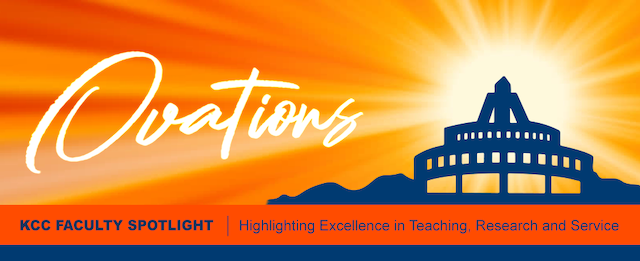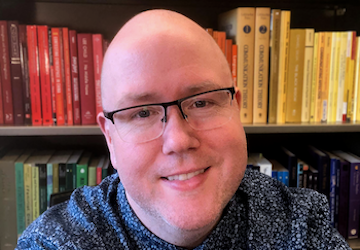Ovations


Dr. Gordon Alley-Young
Dr. Gordon Alley-Young, dean of faculty and speech communication professor, presented a paper titled “Bitter Living Through Science: Melodramatic and Moral Readings of Gay Conversion Therapy in A Place to Call Home” at the National Communication Association Annual Convention on November 21st.
A professional organization supporting member scholars, teachers and practitioners, the National Communication Association advances communication as the discipline that studies all forms, modes, media, and consequences of communication through humanistic, social scientific, and aesthetic inquiry.
In keeping with the conference’s theme, “Renewal and Transformation,” Alley-Young’s paper centered on the depiction of a gay-conversation experience in the post-WWII Australian TV drama. “I have an interest in period dramas,” noted Alley-Young, who had recently written a book chapter about gender roles and whiteness in Downton Abbey. “Like Downton Abbey, A Place to Call Home (APTCH) is set in a time of great cultural change: in this case, 1950's Australia. It focuses on the wealthy Bligh family and chronicles their attempts to embrace and/or ignore massive cultural changes happening after WWII.”
Alley-Young focused on the storyline of the eldest son, James Bligh, who struggles with his homosexuality, including submitting to barbaric pseudo-medical interventions at a private clinic to try and change his sexual orientation.
“During this postwar period, much of the emphasis was on shoring up the authority of the white, patriarchal and heteronormative family,” he explained. “At the same time, science and medicine were increasingly being seen as ways of solving what society perceived to be problems. APTCH depicts how LGBTQ+ people – and progressive women – were seen as threats to the dominant heteronormative social order and thus subject to interventions or eradication via intersecting and interdependent moral and medical discourses.”
“The depiction of James' experience with sexual orientation change efforts (SOCE) like shock treatment, insulin comas, and vomit inducing drugs is sadly accurate and was not even as extreme as what some people experienced in real life. As an LGBTQ+ person, I was eager to explore this subject, but reading and writing about real-life SOCE experiences and watching its dramatization day-in and day-out took an emotional toll on me.” Alley-Young also connected to this storyline because his maternal grandmother underwent electroshock sessions from doctors in 1950 as a treatment for depression. He recounts, “Instead of curing my grandmother’s depression, it destroyed her long-term memory, leaving her only with memories of 1950 and before. As a result, she remained in care until she died in 1980.”
“Through my research, I learned that the legacy of SOCE in the 1950's continues to resound today in the healthcare inequality experienced by women and LGBTQ+ people; this inequality is magnified for individuals who are BIPOC,” Alley-Young shared. “After homosexuality was no longer classified as a mental illness, and as it began to be decriminalized, the threat of SOCE did not disappear, it just went underground. To this day extremist faith organizations continue to use SOCE methods.” He went on to say, “We can only estimate the number of lives being destroyed by these practices. This is one of the troubles with period drama: when the program ends, we forget that the problematic history that is dramatized for us on the screen still lives with us, it haunts us.”
His paper also explores how the cast of APTCH used their public platforms to usher in marriage equality in Australia. “James' story was unfolding on Australian TV as the government was surveying the entire country by mail-in ballot about marriage equality in 2017. APTCH's cast created videos, participated in mass gatherings, and signed open letters addressed to the nation's leaders to urge a ‘yes’ vote for marriage equality.” On November 15, 2017, the results from the survey revealed that 61.6% of respondents had voted ‘yes’ and the government subsequently passed a bill that allowed the first same-sex marriage to occur on December 15, 2017. Alley-Young argues that marriage equality efforts by the cast of APTCH likely influenced the program’s main demographic, aged fifty-five and older, who were also the most likely to participate in the mail-in vote.
Alley-Young’s paper will be included as a chapter in the forthcoming book Diagnosing History: Medicine in Television Period Dramas, edited by Katherine Byrne, Julie Anne Taddeo and James Leggott and published by Manchester University Press, due out in March.
